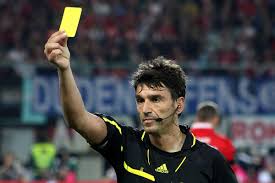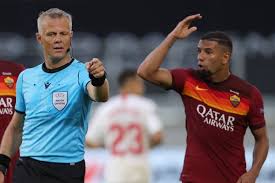List Of Contents
- 1 Responsibilities of a Game Referee
- 1.1 Qualities of an Effective Game Referee
- 1.2 The Evolution of Refereeing in E-Sports
- 1.3 Challenges Faced by Game Referees
- 1.4 Training and Certification for Referees
- 1.5 Technological Advances in Refereeing
- 1.6 The Future of Refereeing
- 1.7 Importance of Referees in Promoting Sportsmanship
- 1.8 Conclusion Game Referee
- 2 Author
A game referee is a critical figure in the world of sports and gaming, responsible for maintaining fairness, enforcing rules, and ensuring the smooth conduct of events. Whether in traditional sports, e-sports, or other competitive activities, referees play a pivotal role in upholding the integrity of the competition.
Responsibilities of a Game Referee

A game referee’s responsibilities vary depending on the sport or game. However, their overarching duties include:
- Enforcing Rules: Referees ensure that all participants adhere to the official rules and regulations of the game. They interpret these rules impartially to avoid any advantage to one side.
- Maintaining Fairness: A referee acts as a neutral party to ensure fair play. This involves penalizing misconduct, resolving disputes, and preventing any form of bias.
- Monitoring Gameplay: From start to finish, referees keep a watchful eye on the actions of players to identify any infractions or violations.
- Ensuring Safety: Referees are responsible for ensuring that the playing environment is safe for participants. They may stop the game if conditions become dangerous or if players engage in harmful conduct.
- Making Decisions: Quick and accurate decision-making is crucial for referees. They must be able to assess situations in real time and make rulings that impact the flow and outcome of the game.
Qualities of an Effective Game Referee
Being a referee requires a unique set of skills and attributes. Some key qualities include:
- Impartiality: A Game Referee must remain unbiased, treating all players and teams equally regardless of personal preferences or external pressures.
- Strong Communication Skills: Effective communication with players, coaches, and other officials is essential for a referee to explain decisions and maintain control.
- In-depth Knowledge: Game Referee must have a thorough understanding of the rules and nuances of the game they officiate.
- Physical Fitness: In many sports, Game Referee need to keep up with the pace of the game, which demands good physical fitness.
- Confidence and Authority: A Game Referee must exude confidence and command respect to maintain control of the game and handle disputes effectively.
The Evolution of Refereeing in E-Sports

E-sports has brought a modern twist to the traditional concept of refereeing. Unlike physical sports, e-sports Game Referee, often called admins or moderators, focus on digital platforms and virtual rules. Their responsibilities include:
- Monitoring Online Gameplay: E-sports referees ensure that players adhere to game rules in online environments. This includes preventing cheating through hacks or exploits.
- Handling Technical Issues: They troubleshoot technical problems, such as connectivity issues or hardware malfunctions, to ensure a seamless gaming experience.
- Maintaining Fair Play: In e-sports, fair play extends to ensuring that players follow ethical guidelines, such as avoiding toxic behavior or harassment.
Challenges Faced by Game Referees
Game Referee face numerous challenges, some of which can be stressful and demanding:
- Dealing with Disputes: Player and coach disagreements with referee decisions are common, requiring referees to handle conflicts diplomatically.
- Maintaining Focus: Long games or tournaments can be mentally and physically draining, making focus a critical challenge.
- Public Scrutiny: Referees often face criticism from fans, players, and the media, especially when their decisions are controversial.
- Keeping Up with Changes: Rules and gameplay strategies evolve, and referees must stay updated to ensure they officiate accurately.
Training and Certification for Referees
Becoming a Game Referee often requires formal training partaitogel and certification. Many sports organizations offer programs to teach prospective referees about the rules, decision-making processes, and game management. Certification typically involves:
- Classroom Instruction: Covering the theoretical aspects of the game, such as understanding rules and ethical considerations.
- Practical Training: Hands-on experience through simulations or officiating in practice matches.
- Examinations: Written and practical exams to assess knowledge and readiness.
- Continuous Education: Referees are encouraged to attend workshops or courses to stay updated with rule changes and new techniques.
Technological Advances in Refereeing

Technology has significantly impacted refereeing in recent years, enhancing accuracy and fairness. Key advancements include:
- Video Assistance: Video replay systems allow referees to review decisions and ensure accuracy in critical moments.
- Wearable Devices: Devices such as fitness trackers help referees monitor their physical performance during games.
- Communication Systems: Headsets and other communication tools enable better coordination among referees and officials.
- AI Integration: Artificial intelligence is increasingly being used to analyze gameplay and assist referees in making decisions.
The Future of Refereeing
The role of referees is continually evolving with advancements in technology and changes in gameplay dynamics. In the future, we may see:
- Increased Automation: AI and machine learning could take over certain aspects of refereeing, such as rule enforcement in e-sports.
- Enhanced Training Tools: Virtual reality and other technologies may be used to train referees more effectively.
- Global Standards: With the rise of international tournaments, efforts to standardize refereeing practices across regions and games are likely to increase.
Importance of Referees in Promoting Sportsmanship
Beyond enforcing rules, referees play a crucial role in promoting sportsmanship. Their actions and decisions set the tone for how players and spectators perceive fairness and integrity in the game. By acting as impartial arbiters, referees ensure that competition remains respectful and ethical.
Conclusion Game Referee
The role of a game referee is multifaceted, requiring a combination of knowledge, skill, and emotional intelligence. Whether in traditional sports or the rapidly growing field of e-sports, referees are indispensable in ensuring fair play and maintaining the spirit of competition. As technology continues to shape the world of sports and gaming, the responsibilities and capabilities of referees will evolve, but their core mission of upholding fairness and integrity will remain unchanged.

